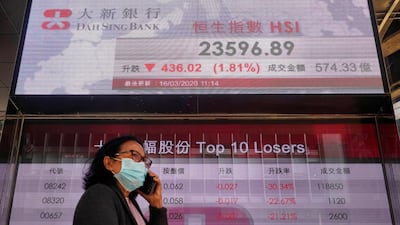Is it possible that the Covid-19 just ushered in an extended era of low oil prices and a global recession?
The markets went into shock on March 8, now referred to as Black Monday, when the Opec+ alliance failed to reach an agreement on deeper production cuts. We may end up calling it Black March given the events that followed.
Oil prices fell 24 per cent in one day, the worst fall since the Gulf War in 1991 and headed towards the largest weekly collapse since the 2008 subprime crisis. A chain reaction followed.
Broader European markets went towards meltdown and US equities entered a bear market. The US, EU and Canada declared emergencies, triggering trillions of US dollars in fiscal support to their populations as the European Commission told member states to pump as much money as they need into their economies.
Countries around the world went into lockdown, meaning a complete change in the working environment and slowdown in consumer spending which is expected to have a knock-on effect on worldwide manufacturers’ revenue. Travel restrictions are crushing airline business and demand for fuel, meaning that oil prices fell head over heels to land at $20.
On March 16, the Federal Reserve cut its key rate to zero and launched a $700 billion (Dh2.57 trillion) quantitative easing programme to calm investors. Instead, investors are staring blankly at a mirror of 2008 with all that could mean – low commodity prices for years to come, a vulnerable banking sector, steep losses in equity markets and a stricken private sector.
The coronavirus pandemic was the last straw for the Opec+ alliance set up in recent years to balance energy prices after a massive surge in US shale production which started in 2016.
Opec and Russia U-turned on their policy aimed at undercutting competing prices and went their separate ways, raising the possibility of an Opec-US Shale alliance.
Saudi Arabia is tipped to have a strong hand because it has been building up large reserves during supply cuts in recent years. The country aims to supply 12.3 million barrels per day, higher than its current capacity, meaning it may be using reserves to boost its supplies.
Along with the push towards a more diversified economy in the Gulf, the rivalry to regain market share from US Shale and Russia is a gamble which could pay off well.
Aramco’s initial public offering added to Saudi Arabia’s oil coffers, ensuring even deeper pockets and the capacity to ride it out until the global economy improves.
The silver lining is that China’s appetite for oil appears to be returning to historic levels this month following a steep drop off in February, according to shipping industry reports. This is positive for its number one oil supplier Saudi Arabia, albeit at lower prices.
It is likely to take more time than expected for China to recover from the effects of the virus. Industrial output figures show that factory output fell by 13.9 per cent in January and February, meaning that first-quarter growth could possibly be halved.
A lot depends on how long the pandemic prevails. In China, it has been dominating the economy for over four months. In Europe, the UK and the US the rate of infection and economic costs are rising.
In the worst case, a global recession will be confirmed by the second half of the year and low oil prices may be entrenched in the medium-to-long term. In the best case, the rapid measures taken by world governments to stop the spread of the virus are successful and by the fourth quarter, growth and demand for oil will start recovering.
Sentiment is understandably fearful and investors are selling off risk and safe haven assets while battening down the hatches with liquidity for an unpredictable future.
Hussein Sayed is the chief market strategist at FXTM

